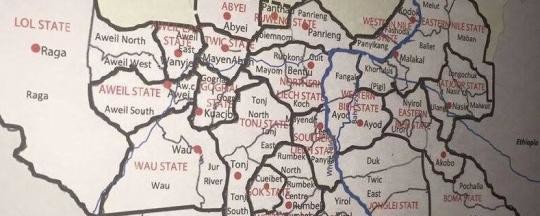Civil servants of the Upper Nile State government have been dismissed on the basis of their place of origin, according to a new administrative order by the successor government of East Nile State.
President Salva Kiir has divided Upper Nile State into three successor states predominantly on a racial basis, with West Nile State inhabited mostly by Shilluks, East Nile by Dinkas and Latjor State by Nuers. The former state capital at Malakal was left in the hands of East Nile State, though it used to be a multi-ethnic city.
Opposition parties say Kiir’s decree creating the successor states is illegal and they have asked the Supreme Court to reverse his order dividing Upper Nile and the other nine states of South Sudan.
Nonetheless, ‘East Nile’ state officials who control the payroll system and other administrative mechanisms of the now ‘defunct’ Upper Nile government have gone ahead to purge the state civil service on a racial basis.
In a new service circular, a copy of which was obtained by Radio Tamazuj, civil servants from the two Western Nile and Latjor states are informed of their termination and transfer from Eastern Nile State to their respective states.
The circular dating 1 February bears the signature of James Daniel Chuang, Secretary General of the government of Eastern Nile. It directs civil servants hailing from ‘Eastern Nile’ – the predominantly Dinka-inhabited part of Upper Nile State – to fill up positions which were previously held by employees from other parts of Upper Nile.
The circular directs that all employees from Eastern Nile state should remain in their positions of work.
Members of parliament from the new states of Latjor and Western Nile have condemned termination of their service and transfer of employees who were formerly working as part of the workforce of Upper Nile State to the new successor governments.
A group of 16 members of parliament, seven of whom comes from the state parliament and nine from the national legislative assembly in Juba, have objected to the process, saying it is divisive.
“We believe this decision is not in the interest of peace, unity and cohesion. It clearly shows determination to further divide of our people and social disharmony,” says James Reat Gony, one of the leading members of parliament at the national legislative assembly in Juba, who hails from the new Latjor State.
On the other hand, Daniel Yor Akec, minister of finance and public service in Eastern Nile state, argued that the decision was not meant to further divided communities but rather was part of an administrative process to divide the labour force in accordance with the new system and based on the capacity of each state.
“The workforce as you know is all about budget. The budget we are working on now is to cater for services and employees who are from Eastern Nile state. If there is a need to recruit from other states, then this is something which the council of ministers and the state parliament will have decide,” Yor explained.
Members of the caucuses of the Equatorian, Nuer and Shilluk MPs in the national parliament last November opposed a vote on constitutional amendments authorizing the creation of the 28 states, which later led to the dismissal of a number of ruling party MPs from their positions as committee chairpersons or deputies.
Related:
What steps are needed to create 28 states in South Sudan? (28 Nov. 2015)




